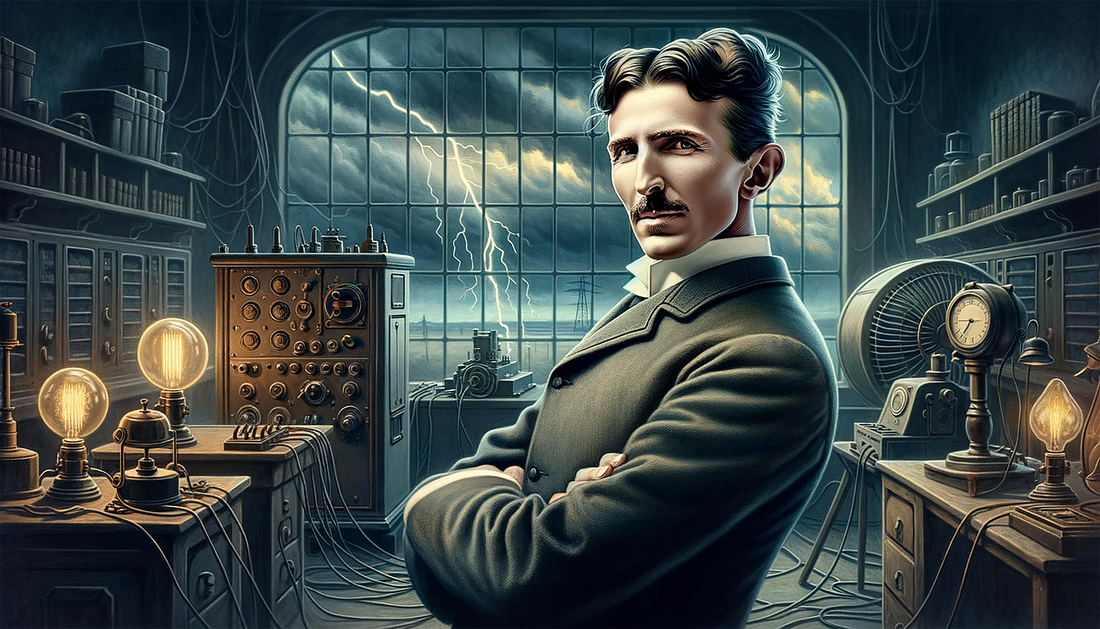
The Visionary Mind of Nikola Tesla: Uncovering the Inspirations Behind His Groundbreaking Discoveries
Share
Nikola Tesla, the pioneering inventor and engineer, left an indelible mark on the world of science and technology. His revolutionary ideas and innovations continue to shape our modern world, from the alternating current (AC) system to radio communication and beyond. But what drove this genius to make such profound contributions? Let's delve into the inspirations that fueled Tesla's remarkable journey.
Early Life and Influences
Born in 1856 in Smiljan, Croatia, Tesla grew up in a family that valued education and encouraged his curiosity. His father, Rev. Milutin Tesla, was a priest and a writer, while his mother, Đuka Tesla, managed the family's farm. Nikola's innate fascination with science and technology was nurtured by his parents, who supported his exploration of the natural world.
Tesla's inspirations can be traced back to his childhood, where he was captivated by the workings of the universe. He was particularly drawn to the study of electricity, which became his lifelong passion. The young inventor devoured books on science and mathematics, laying the foundation for his future breakthroughs.
Inspirations from Nature
Tesla's love for nature played a significant role in shaping his ideas. He believed that the secrets of the universe lay hidden in the natural world, waiting to be uncovered. His observations of the environment and living organisms inspired many of his innovations. For instance, his design for the AC system was influenced by the principles of alternating currents found in the Earth's magnetic field.
The inventor's fascination with the workings of the human brain and the nervous system also led him to explore the concept of resonance, which became a cornerstone of his research. He recognized that the universe was full of vibrations and frequencies, and he sought to harness these energies to create innovative technologies.
Inspirations from Other Thinkers
Tesla was heavily influenced by the works of other visionaries and scientists. He was deeply interested in the ideas of Michael Faraday, James Clerk Maxwell, and Heinrich Hertz, among others. He built upon their discoveries, using their findings as a springboard for his own groundbreaking research.
Tesla's collaborations with George Westinghouse, a pioneer in the field of electrical engineering, also played a significant role in his development of the AC system. Their partnership demonstrated the power of collaboration and the importance of building upon the ideas of others.
Legacy and Impact
Tesla's contributions to science and technology are immeasurable. His work on the AC system revolutionized the way electricity is transmitted and used, enabling the widespread distribution of power. His innovations in radio communication, X-ray technology, and the development of the electric motor have had a lasting impact on our world.
In conclusion, Nikola Tesla's inspirations were diverse and far-reaching, drawing from his early life, observations of nature, and the works of other thinkers. His legacy serves as a testament to the power of human ingenuity and the importance of exploring the unknown. As we continue to build upon his discoveries, we honor the visionary mind of Nikola Tesla and the boundless potential of the human spirit.
Early Life and Influences
Born in 1856 in Smiljan, Croatia, Tesla grew up in a family that valued education and encouraged his curiosity. His father, Rev. Milutin Tesla, was a priest and a writer, while his mother, Đuka Tesla, managed the family's farm. Nikola's innate fascination with science and technology was nurtured by his parents, who supported his exploration of the natural world.
Tesla's inspirations can be traced back to his childhood, where he was captivated by the workings of the universe. He was particularly drawn to the study of electricity, which became his lifelong passion. The young inventor devoured books on science and mathematics, laying the foundation for his future breakthroughs.
Inspirations from Nature
Tesla's love for nature played a significant role in shaping his ideas. He believed that the secrets of the universe lay hidden in the natural world, waiting to be uncovered. His observations of the environment and living organisms inspired many of his innovations. For instance, his design for the AC system was influenced by the principles of alternating currents found in the Earth's magnetic field.
The inventor's fascination with the workings of the human brain and the nervous system also led him to explore the concept of resonance, which became a cornerstone of his research. He recognized that the universe was full of vibrations and frequencies, and he sought to harness these energies to create innovative technologies.
Inspirations from Other Thinkers
Tesla was heavily influenced by the works of other visionaries and scientists. He was deeply interested in the ideas of Michael Faraday, James Clerk Maxwell, and Heinrich Hertz, among others. He built upon their discoveries, using their findings as a springboard for his own groundbreaking research.
Tesla's collaborations with George Westinghouse, a pioneer in the field of electrical engineering, also played a significant role in his development of the AC system. Their partnership demonstrated the power of collaboration and the importance of building upon the ideas of others.
Legacy and Impact
Tesla's contributions to science and technology are immeasurable. His work on the AC system revolutionized the way electricity is transmitted and used, enabling the widespread distribution of power. His innovations in radio communication, X-ray technology, and the development of the electric motor have had a lasting impact on our world.
In conclusion, Nikola Tesla's inspirations were diverse and far-reaching, drawing from his early life, observations of nature, and the works of other thinkers. His legacy serves as a testament to the power of human ingenuity and the importance of exploring the unknown. As we continue to build upon his discoveries, we honor the visionary mind of Nikola Tesla and the boundless potential of the human spirit.


